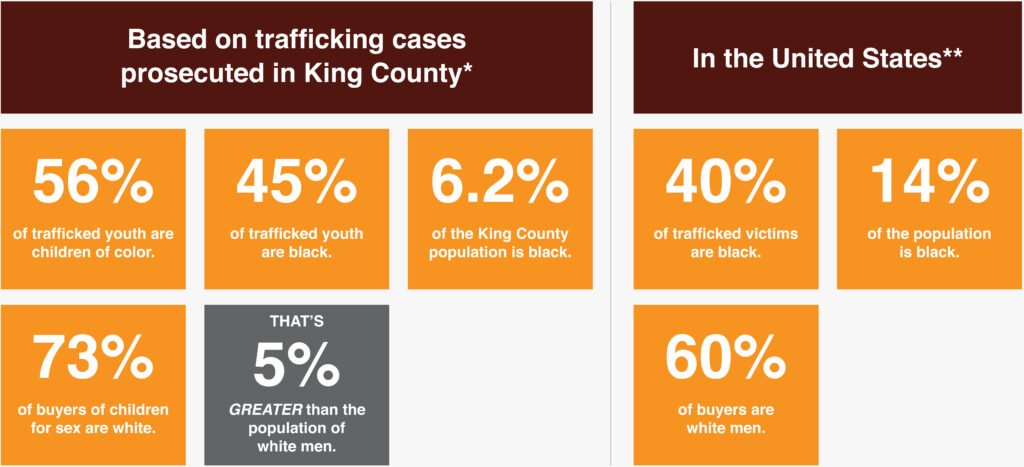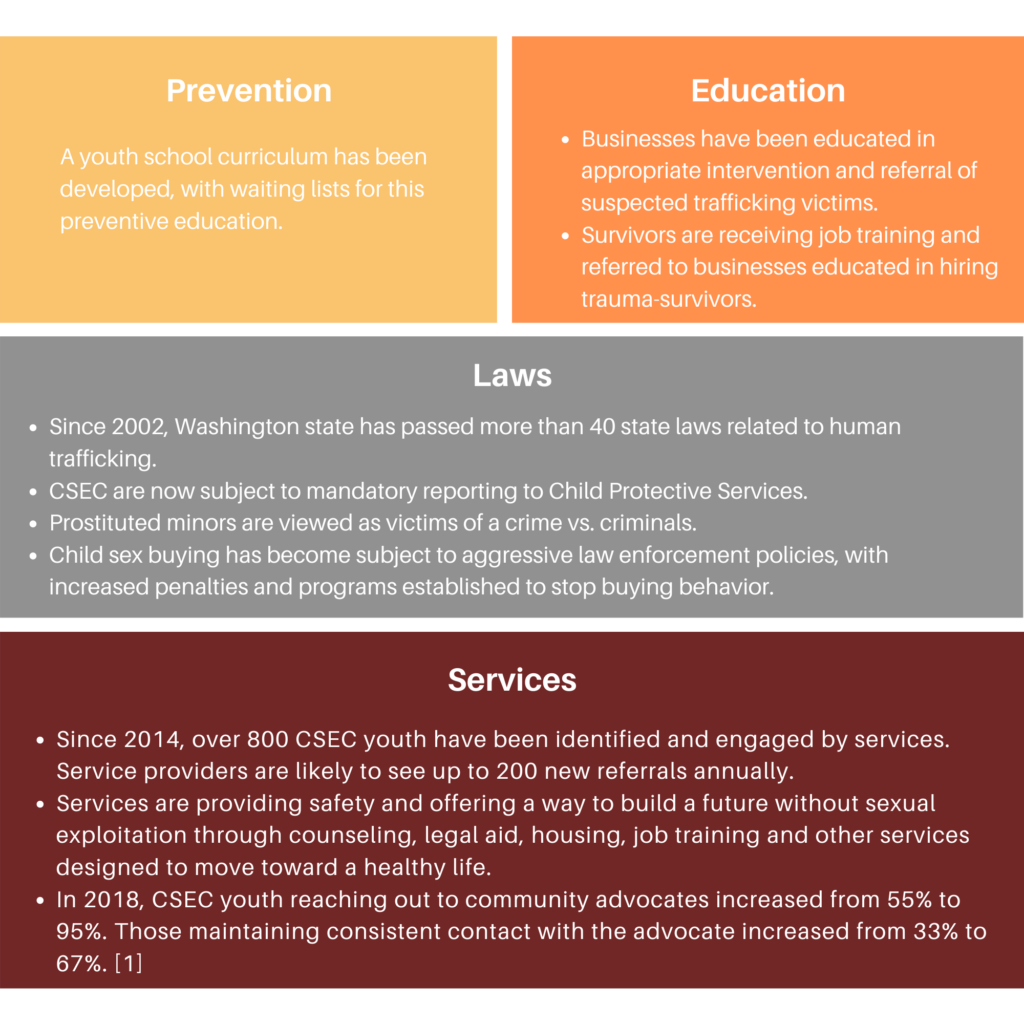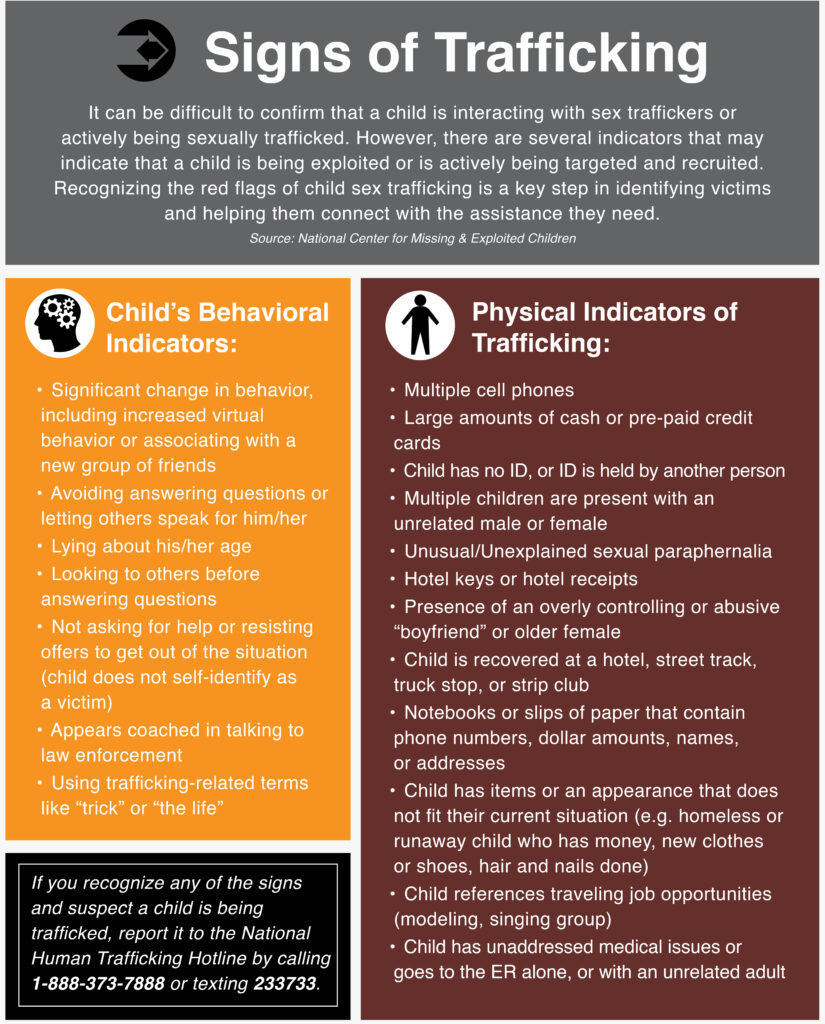WHAT IS CHILD SEX TRAFFICKING?
Child sex trafficking, defined by the Department of Justice, “refers to the recruitment, harboring, transportation, provision, obtaining, patronizing, or soliciting of a minor for the purpose of a commercial sex act.”
A commercial sex act involves the exchange of anything of value, such as money, drugs, food, clothes or a place to stay, in exchange for sexual activity.
Child sex trafficking is a growing national crisis. No child can consent to sex or to be sold for sex, or is immune to sex trafficking regardless of race, socioeconomic status, or location. Additionally, youth vulnerabilities are becoming more exacerbated and the internet makes detection, protection and prosecution difficult.
And what about Covid-19 and trafficking?
There is a massive increase in online sex predators targeting kids with the intention to assault and exploit social, financial and psychological vulnerabilities associated with Covid-19,[i] and more school-aged children are making prolonged use of the Internet. Some youth are quarantined with their abusers. Many are preferring the streets to sheltering in place, putting them at more risk to traffickers looking to exploit their vulnerabilities.

Sources:
* King County Sexual Exploitation Cases, The Data Behind the Charges.
Commercially Sexually Exploited Children in Seattle/King County Update
The Cause and Consequence of Human Trafficking: Human Rights Violation
Racial and Gender Disparities in the Sex Trade
Commercially Sexually Exploited Children in King County 2019 Update by Dr. Debra Boyer

SUGAR DATING

What is sugar dating/sugaring?
“Sugaring” or “Sugar Dating” is an exploitative practice when young people go on dates, often to include or with the expectation of having sex, in exchange for gifts or payments. Often, wealthy, older, males (“sugardaddies”) and, less often women (“sugarmommies”), proposition younger, sometimes low-income, girls, boys, women and men (“sugarbabies”) promising luxury gifts, rent, tuition payments, or cash.
Sugaring language is normalized in pop culture, including in movies, music and social media. Glamorizing the sugardaddy and sugarbaby language makes it seem normal and acceptable, when in fact it is thinly-masked prostitution, it is illegal if the young person is under 18 years, and it can quickly escalate into abuse and sex trafficking.
Why is sugar dating prostitution?
While advertised as a unique, mutually-beneficial, and even empowering dating experience, these relationships are transactional wherein men have the expectation of and can buy sex. This power dynamic is no different than prostitution.
Additionally, much like prostitution, sugar dating targets young men and women who place themselves in a vulnerable position as a sugarbaby.


Project: SugarFree
While working for a financial client, DNA Seattle was startled to find tens of thousands of online solicitations for sugarbabies and discovered that sugaring is becoming normalized and common on college campuses. Partnering with StolenYouth, DNA developed data analytics tools and automated AI technology to intersect, educate and help dissuade potential sugaring victims and suppress the abusers looking to exploit them.
How can you help?
- Educate your friends and family about the dangers of sugar dating.
- Contact your school leadership to bring awareness and change.
- Never reply to a stranger on social media.
- Report anything suspicious you see on social media.
- Write, or ask StolenYouth for, an article for your school newspaper.
- Invite StolenYouth to speak to your friends, family, and networks.
Check out our list of resources for how to stay safe online and educate yourself on the dangers of sugar dating.
HEAR FROM A SURVIVOR
SUCCESSES
Since 2008, there has been steady progress made to combat the commercial sexual exploitation of children (CSEC). Seattle and King County have gained national recognition for a coordinated, collaborative, and multidisciplinary service system, protective legislation on sex trafficking, and innovative and aggressive policies against sex buying. Local initiatives in Seattle and King County include:

[1] Parker, E.M., Pullmann, M.D., & Mangiaracina, K. (November 2018). System & service use patterns of youth in the child welfare system who are commercially sexually exploited & the role of a multi-disciplinary interagency taskforce. American Public Health Association. San Diego, CA.

